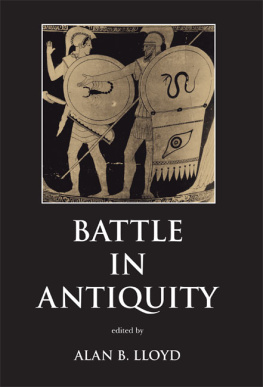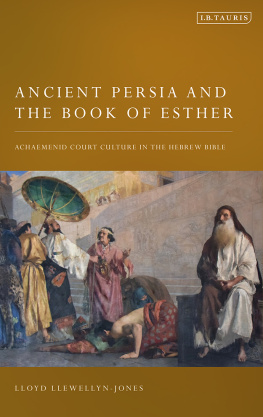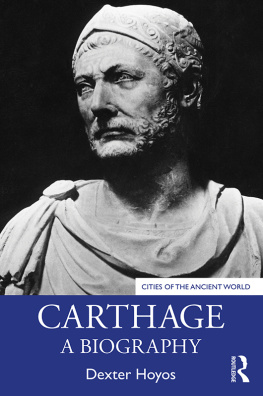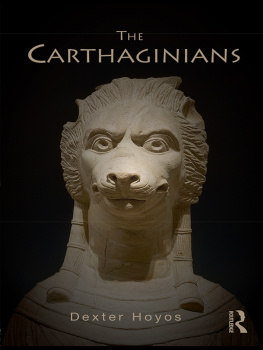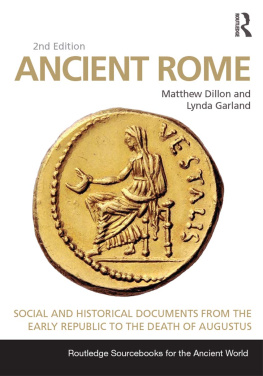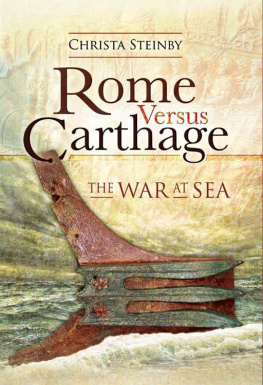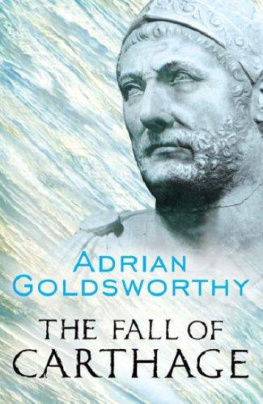Lloyd - Destroy Carthage!: the death throes of an ancient culture
Here you can read online Lloyd - Destroy Carthage!: the death throes of an ancient culture full text of the book (entire story) in english for free. Download pdf and epub, get meaning, cover and reviews about this ebook. City: London;Carthage (Extinct city);Karthago;Tunisia;Carthage (Extinct city, year: 1977, publisher: Souvenir Press Ltd, genre: History. Description of the work, (preface) as well as reviews are available. Best literature library LitArk.com created for fans of good reading and offers a wide selection of genres:
Romance novel
Science fiction
Adventure
Detective
Science
History
Home and family
Prose
Art
Politics
Computer
Non-fiction
Religion
Business
Children
Humor
Choose a favorite category and find really read worthwhile books. Enjoy immersion in the world of imagination, feel the emotions of the characters or learn something new for yourself, make an fascinating discovery.
Destroy Carthage!: the death throes of an ancient culture: summary, description and annotation
We offer to read an annotation, description, summary or preface (depends on what the author of the book "Destroy Carthage!: the death throes of an ancient culture" wrote himself). If you haven't found the necessary information about the book — write in the comments, we will try to find it.
Destroy Carthage!: the death throes of an ancient culture — read online for free the complete book (whole text) full work
Below is the text of the book, divided by pages. System saving the place of the last page read, allows you to conveniently read the book "Destroy Carthage!: the death throes of an ancient culture" online for free, without having to search again every time where you left off. Put a bookmark, and you can go to the page where you finished reading at any time.
Font size:
Interval:
Bookmark:
DESTROY CARTHAGE!
Books by Alan Lloyd
antiquity
Destroy Carthage!
The Taras Report Marathon
general history
The Spanish Centuries
(Espana a Traves de los Siglos)
The Year of the Conqueror
(American title: The Making of the King 1066)
biography
King John
(American title: The Maligned Monarch) The Wickedest Age
(American title: The King Who Lost America) Franco
military history
The Scorching of Washington
The Drums of Kumasi
The War in the Trenches
The Hundred Years War
The Zulu War
novels
The Eighteenth Concubine
DESTROY CARTHAGE!
The Death Throes of an Ancient Culture
By
ALAN LLOYD
BOOK CLUB ASSOCIATES LONDON
Copyright 1977 by Alan Lloyd
First published 1977 by Souvenir Press Ltd, 43 Great Russell Street, London WCiB 3 PA and simultaneously in Canada
This edition published 1977 by Book Club Associates By arrangement with Souvenir Press
All Rights Reserved. No part of this publication may be reproduced, stored in a retrieval system, or transmitted, in any form or by any means, electronic, mechanical, photocopying, recording or otherwise, without the prior permission of the Copyright owner
ISBN o 285 62235 8
Printed in Great Britain by Bristol Typesetting Co. Ltd, Barton Manor, St Philips, Bristol
Contents
BOOK ONE
16 BOOK TWO




BOOK ONE
Surveying the Bay of Carthage from the modern Plage d'Annibal, it is difficult to believe that here, in its age, stood the greatest merchant centre of the western world; that from the sands of that tawny, inert shore sailors sought mysterious Thulsa in the northern mists, traders braved the Sahara for Pigmy gold, generals marched turreted elephants to distant wars.
Few cities of such stature have disappeared so profoundly, more violently. The relics are minimal. This is the story of that disappearance, of the extinction at a stroke of a civilized, thriving state; the history that lingers on a haunted coast. Among the ghosts to be discovered as the tale unfolds, not the least assertive may be the first.
Two centuries before Christ, the plateau of Maktar, in present-day Tunisia, was the territory of Masinissa, king of the Numidians. To the writers of antiquity, Masinissa was a barbarian, a cunning savage with a varnish of culture acquired from neighbouring Carthage and the Romans. His prurience, an alleged distinction of the Numidians, was catalogued. He was said to have fathered forty-one sons among his progeny, the last in the eighty-seventh year of a prodigious life.
Masinissa's ambition matched his procreative energies. In his youth, Numidia comprised two kingdoms, the Massylian to the east, with a royal town at Zama - identified with Jama, north of Maktar - and a western realm based on Cirta, now Constantine. Masinissa coveted Cirta from an early age. Scarcely beyond boyhood, the precocious prince led his followers, sanguinary horsemen who rode their barbary ponies bareback, into western Numidia, first driving its ruler, Syphax, to seek refuge with the Moors; somewhat later, seizing his capital and his wife. At the same time, Masinissa flirted dangerously with Mediterranean power politics. The skill and ferocity of his mounted warriors gave his friendship a value to greater states. In the stormy relationship between Rome and Carthage, he switched alliances according to the run of luck, fighting for one then the other with equal zest. Each wooed him, yet, with justification, distrusted him. Dismayed by his passion for Sophonisba, the nubile Carthaginian wife he took from Syphax, the Romans induced him to engineer her suicide. For the major powers, confrontation was a grim game with heavy costs. For Masinissa, it meant profit, the fulfilling of his appetites.
His kingdom prospered wonderfully. Its treasury multiplied, its army grew, it even obtained a fleet. Despite turbulent chieftains, whom he checked with a heavy hand, Masinissa increasingly turned his eyes to distant parts. His envoys made overtures in Egypt and Libya. Perhaps his dreams were pan- African. Certainly, his subjects, once a plundering tribe of the meseta, became an organized and flourishing people: a force, some feared, which might unite the entire north of the subcontinent.
As the 3rd century bc - a century of desperate violence in the western Mediterranean - approached its conclusion, Masinissa was in his prime. Below his native plateau, on the gulf of Tunis, a hundred miles or so from Zama, lay Carthage, the templed queen of Africa, her lands and associates established on the coastal plain. Masinissa envied her markets, her busy harbours, her influence and knowledge.
Beyond the city, across the sea Carthaginian traders had once called their own, republican Rome, still shaken by Hannibal's aggression, stubbornly reaffirmed her role of expansion in world affairs: a role Masinissa was ready to utilize. These were the fulcrums of his strategy; the first, rich in the resourcefulness and enterprise of her Phoenician heritage, a gem worth all the stones in Numidia; the second, a steely tool which might yet chip the prize from bedrock into its neighbour's lap. To the east, Greece and Egypt continued their long decline, secondary on Masinissa's skyline, while westward, Spain, the uncivilized object of colonial rivalry, marked the end of the ancient world - at least for all save a tiny band of daring men. It was from the settlements in Spain that the latest clash of the great powers, the Second Punic War of history, had spread to Italy and, now in its final throes, swayed to Africa.
Two years before the new century, the dust of advancing armies accented the Numidian marches. A Roman column was moving from the coast up the valley of the river Bagrades (Medjerda), penetrating the elevated hinterland behind Carthage. At its head rode the brilliant Publius Cornelius Scipio, distinguished later as 'Africanus Major.' His father and uncle had died in Spain campaigning against the Carthaginians. Scipio, succeeding to their command, had been conspicuous in wresting the initiative from Hannibal.
Simultaneously, Hannibal himself, returned from Italy, advanced to intercept the foe. The battle which followed their conjunction near Zama was preceded by a celebrated interview. Bringing the rival generals face to face for the first time, the meeting captured the imagination of the ancient world. 'Mutual admiration struck them dumb,' exclaimed Livy. 'They gazed at each other in silence.'
Hannibal Barca, reflected in numismatic portraiture as craggily handsome with a curly mane, already a byword for audacity, was willing to make peace. Hope of winning the war with Rome had faded, but an awesome reputation supported the proposition he essayed. A Roman defeat now would blemish his rival's fame. Better an amicable compromise, he declared, than to gamble for more on the battlefield.
Scipio, whose thin-lipped, shaven-headed effigy suggests a practical and penetrating intellect, was a move ahead. Numerically, the armies were balanced, though Hannibal alone possessed elephants, the heavy assault vehicles of the age. Scipio's confidence reposed in a pact with Masinissa whereby the king's mounted warriors would provide the Romans with cavalry ascendancy. Unfortunately, Masinissa had been occupied chastising a factious chief, and was late arriving with his horsemen. Ostensibly disposed to negotiate, Scipio was more concerned to kill time than reach a settlement. Masinissa's approach assured the failure of the interview. The battle of Zama was fought next day.
Next pageFont size:
Interval:
Bookmark:
Similar books «Destroy Carthage!: the death throes of an ancient culture»
Look at similar books to Destroy Carthage!: the death throes of an ancient culture. We have selected literature similar in name and meaning in the hope of providing readers with more options to find new, interesting, not yet read works.
Discussion, reviews of the book Destroy Carthage!: the death throes of an ancient culture and just readers' own opinions. Leave your comments, write what you think about the work, its meaning or the main characters. Specify what exactly you liked and what you didn't like, and why you think so.



